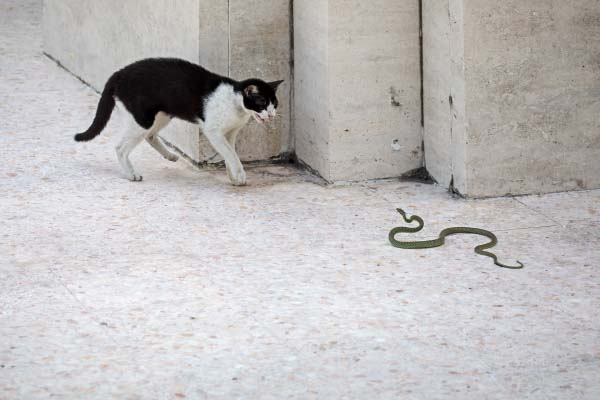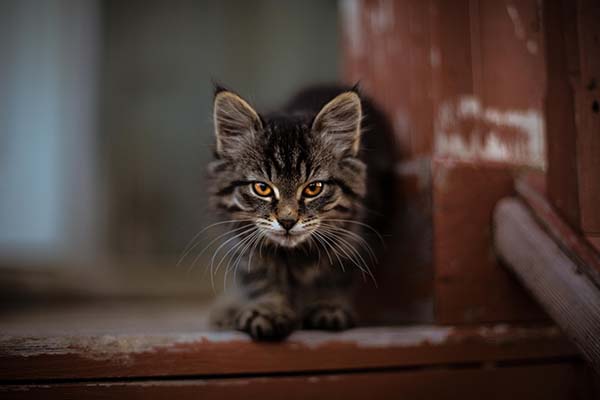In recent years, a peculiar phenomenon has captured cat owners' and internet users' attention: cats jumping and running away from cucumbers. This trend, popularized through countless viral cucumber videos, shows felines reacting with alarm or even terror at the sight of this innocuous vegetable. But what lies behind this strange behavior? Why do cats hate cucumbers?
While the videos of cats leaping in fear from cucumbers may provide a momentary chuckle, it is crucial to understand the potential stress and psychological impact on your feline friends. As responsible pet owners and animal lovers, understanding and prioritizing our feline companions' well-being and comfort over momentary entertainment is essential. Read below to learn the root of this cat's natural caution.
Why are cats scared of cucumbers
Before diving in, it's important to note that cats are not inherently scared of cucumbers. The fear response often seen in viral videos is typically a result of owners startling their cats by unexpectedly introducing the vegetable into their environment. Rather than the cucumber itself, this surprise element triggers their spooked reaction.
Surprise and Instinctive Response
Like many animals, cats have a keen sense of awareness about their surroundings. This heightened alertness functions as a survival mechanism, allowing cats to react quickly to potential threats.
Placing a cucumber behind a cat without their notice, particularly in a familiar setting like their feeding area, the sudden appearance can lead to a startling experience when the cat turns around. After the initial jump scare, most cats will realize it is just a product.
This reaction is an automatic, instinctive response, similar to a human's startle reflex when surprised. It's not necessarily the cucumber itself that scares the cat, but rather the surprise and the suddenness of its appearance.

Association with Predators
In the wild, one of the threats to cats, or their ancestors, would have been snakes. The cucumber's elongated shape and static presence might resemble snakes to a cat at a quick glance. This resemblance can trigger a deep-seated instinctive, natural fear of snakes, leading to the cat's dramatic reaction. It's a defensive mechanism where the cat prepares to defend itself or flee from what it perceives as a potential predator. However, not all cats are fearful of snakes. Depending on the feline's temperament, some cats will hunt snakes.
Violation of Territory
Cats are highly territorial and responsive to alterations in their surroundings. They often feel most secure in familiar settings. Introducing a strange object like a cucumber into this space can be seen as a territorial violation. Cats mark their territory with scent glands, and a new, scentless object suddenly appearing in their territory can be disconcerting. This intrusion into their perceived safe space can cause stress and anxiety, manifesting as fear or defensive behavior.
Lack of Familiarity
Cats use their sense of smell, sight, and sound to navigate and understand their environment. A mild, neutral scent of cucumber might not provide enough sensory information for a cat to recognize it as non-threatening. This uncertainty and its unexpected appearance can cause a cat to react cautiously or fearfully. It's a natural response to an unknown object, where the cat prefers to err on the side of caution until it can ascertain the object's nature and potential threat level.

Stress and Anxiety
Cats, particularly those with a history of anxiety or stress, are more sensitive to changes in their environment. For these cats, any new element, like a cucumber, can exacerbate their stress. The heightened stress response serves as a survival mechanism, where the cat is prepared to react to potential threats.
However, these reactions can seem overblown in a domestic setting, especially to benign objects. Comprehending a cat's stress levels and identifying their sources is vital for creating a comfortable and secure living environment.
Individual Personality and Past Experiences
Each cat's unique personality and past experiences heavily influence their reactions. A cat that has had negative experiences with new objects or environments may be more prone to fear when encountering something like a cucumber.
Conversely, a more adventurous or confident cat might show little to no reaction. These individual differences are important, especially when introducing new stimuli or changes to their environment. Awareness of and respecting these traits is key to ensuring the cat's well-being and fostering a positive human-cat relationship.
Why you should never scare your cat with a cucumber
Intentionally scaring your furry friend with a cucumber or similar objects is not a harmless cucumber prank; it can seriously affect your pet's well-being. Such actions can cause significant stress and anxiety for your cat, leading to a distrustful and tense environment. This stress may manifest in various adverse ways, including changes in eating habits, avoidance behaviors, or even issues with litter box usage.
A scared cat might start associating the fear with their surroundings, including their litter box, potentially leading to problematic behaviors like avoiding the litter box or other areas they previously felt comfortable in. This can disrupt their routine and sense of security, which is vital for their mental health.
Moreover, scaring your cat undermines the trust and bond you've built with them, which is essential for a healthy, nurturing relationship. It's crucial to remember that your cat's emotional and psychological well-being should always be a priority, and respecting their need for a safe and stable environment is key to maintaining their overall health and happiness.
